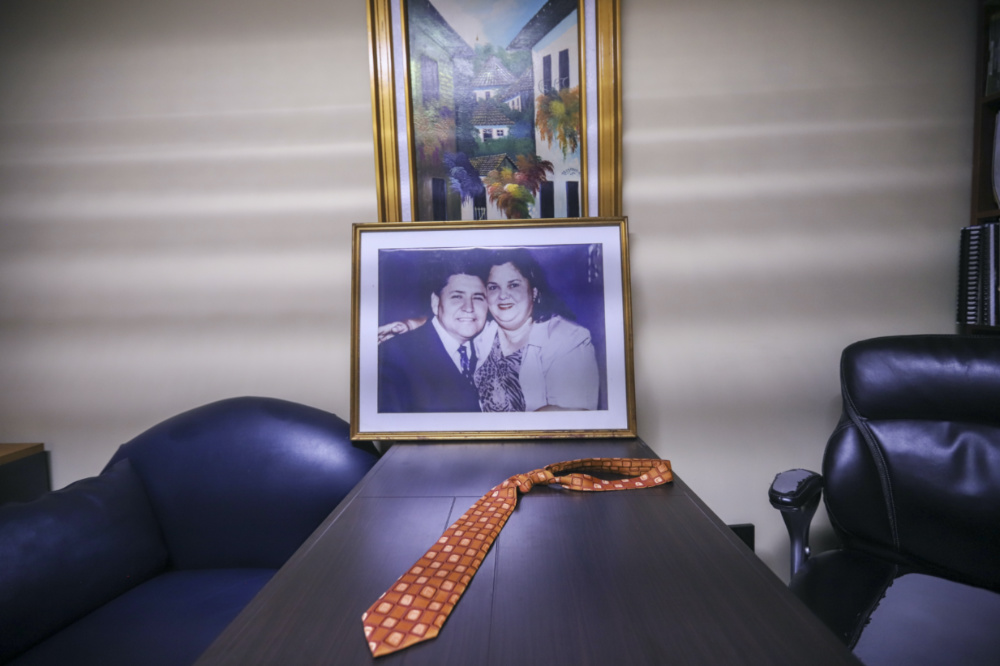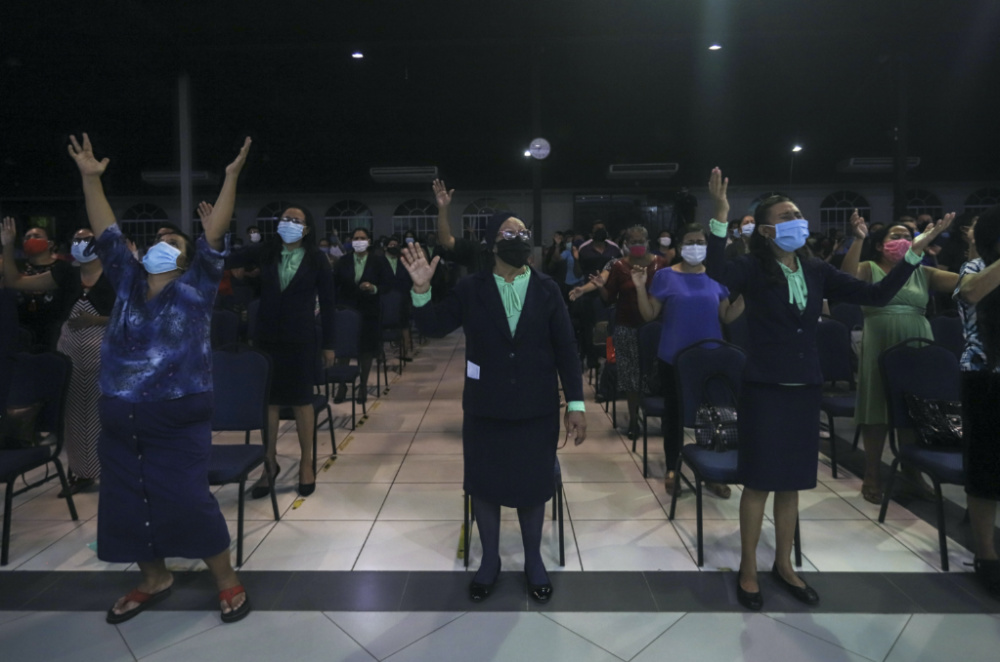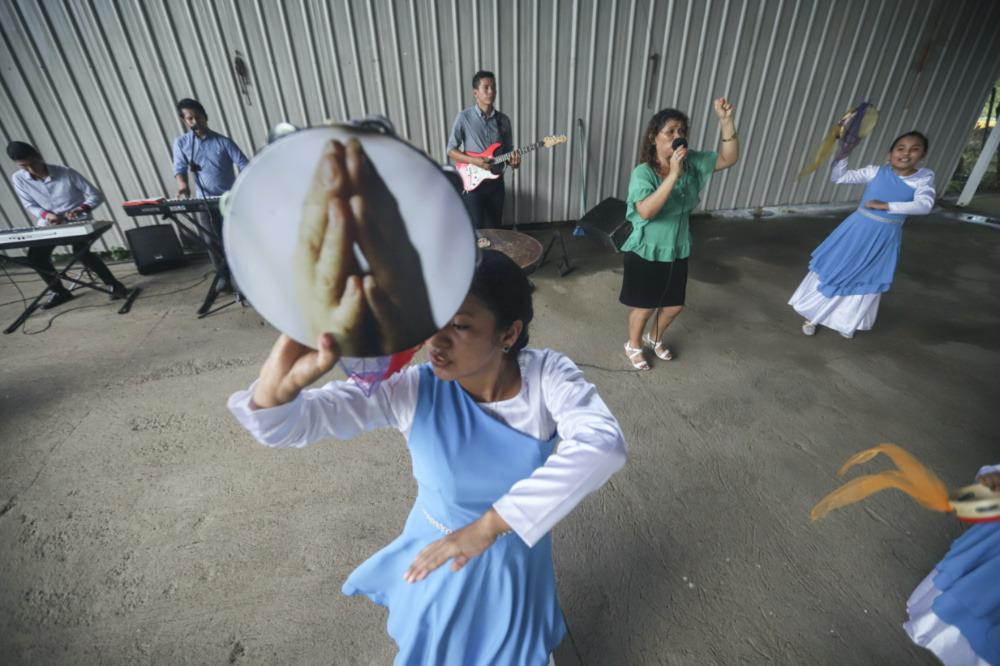
The Associated Press report on the impact of COVID-19 on evangelical churches in Latin America where, in at least two nations, pastors have died in alarming numbers…
Managua, Nicaragua
AP
Some 400 men and women spaced themselves across a sprawling worship hall, praying through face masks with arms raised for the health of friends and family suffering from the novel coronavirus.
The congregation of Managua’s Bethel Restoration church knew the pandemic’s wrath: Two of its pastors were among the more than 40 evangelical leaders who have died in Nicaragua since March.

The tie belonging to the late evangelical Pastor Ovidio Valladares sits on a table in his former office, along with a portrait of him and his wife Aura Maria Valladares at Bethel evangelical church in Managua, Nicaragua, on Wednesday, 12th August. Valladares died from COVID-19 related complications on June 5th, and more than 40 evangelical leaders have died since March from the disease nationwide. PICTURE: AP Photo/Alfredo Zuniga.
Throughout Latin America, a traditionally Catholic region with a surging evangelical presence in nearly every country, evangelical churches have kept spreading the Gospel despite government measures meant to slow the spread of the novel coronavirus. In many countries, evangelical churches have flouted public health guidelines by holding in-person services, or have personally ministered to church members in homes and other settings.
In at least two countries, evangelical pastors have died in alarming numbers during the pandemic.
“Just in our denomination, some 20 pastors have died. And at Bethel we have a pastor, my father and some 25 brothers [members] who died from COVID-19.”
– Raúl Valladares, of Managua’s Bethel Restoration church.
In Bolivia, where some 100 evangelical pastors have died, they have maintained close contact with their congregations, ministering and providing support to the sick even though churches were closed early by government decree.
In Nicaragua, where the government has played down the epidemic and avoided imposing restrictions, evangelical services continued at some churches even as the more hierarchical Roman Catholic churches stopped holding in-person Mass.
“There was too much misinformation,” said Raúl Valladares, who took over Bethel’s congregation after his father and another pastor died on 5th June. “Just in our denomination, some 20 pastors have died. And at Bethel we have a pastor, my father and some 25 brothers [members] who died from COVID-19,” though he said the church had tracked the cases and didn’t believe they stemmed from services.
In Brazil, the Catholic bishop’s conference halted Masses and indoor celebrations after the pandemic hit the country in mid-March, but most evangelicals kept holding services. Authorities began relaxing restrictions in June and some Catholic churches reopened, with extra precautions.
Meanwhile, some evangelical leaders in Brazil have advocated for miraculous cures or called the disease a plague that kills those of little faith and vowed to continue services. They have been strongly backed by President Jair Bolsonaro, who counts many evangelicals among his most fervent supporters. The President declared in March that religious activities were essential during the pandemic, allowing churches to open and religious workers to move around. But some states have enforced their own restrictions.
Beto Marubo, an Indigenous leader in the Javary Valley, a remote region of Brazil bordering Peru, said active services have increased the risks for his people.
“Some have attended evangelical services in the city of Atalaia do Norte and then brought the virus to our lands,” he said.

Women wearing masks to curb the spread of the new coronavirus pray during the afternoon service at the Bethel evangelical church in Managua, Nicaragua, on Wednesday, 12th August. The congregation knows the pandemic’s wrath: two of its pastors are among the more than 40 evangelical leaders who have died in Nicaragua since March. PICTURE: AP Photo/Alfredo Zuniga.
Long after the virus appeared in Nicaragua in March, the government of President Daniel Ortega continued holding and promoting mass events. Schools remained open, the baseball season continued. Ortega, like Bolsonaro, said that the country couldn’t afford to stop working.
In Nicaragua, evangelical churches large and small stayed open too – at least at first.
Bethel stayed open until the Assemblies of God Nicaragua Conference, to which Bethel belongs, told the majority of its churches to close immediately 12th May until 1st June due to the pandemic’s spread. After 1st June, church leaders were allowed to decide when to reopen.
Ovidio Valladares, the family patriarch and director of Bethel’s Radio Restoration, was hospitalised on 26th May and never recovered.
Bethel remained closed until 2nd August, when it reopened with masks required, hand sanitiser at the entrances and spacing between chairs in a large worship hall holding a fraction of its previous capacity of 1,500.
“They went to pray, to visit the sick; in that work they died.”
– Pastor Luis Aruquipa of the National Christian Council in Bolivia.
According to the Nicaraguan Evangelical Alliance, which includes most of the more than 100 Christian denominations in the country, at least 44 pastors have died since March. Not all of those deaths were confirmed as COVID-19 because of a lack of testing.
Evangelical pastors in Bolivia tried to keep in contact with parishioners even though churches in most part of the country remained closed.
“They went to pray, to visit the sick; in that work they died,” said pastor Luis Aruquipa of the National Christian Council, who said more than than 100 evangelical pastors have died in the pandemic.
Among them was Rev Roberto Arismendi, founder of the Evangelical Churches of Bolivia. The 79-year-old Aymara pastor died on 20th July from complications related to COVID-19, said his son Javier Arismendi.
“My father never stopped helping people, he was always close to his congregation, giving them faith, but also food and peace,” said the younger Arismendi, who has taken over the church since his father’s death. “We don’t know in what moment he got infected, but he brought the virus to the whole family.” Eight family members fell ill, but all recovered.
The church, in a working-class La Paz neighbourhood, saw its congregation hit hard. “Thirty per cent of our congregation of almost 100 people were affected,” he said.
Overall, the country of about 11.5 million people has seen more than 108,000 reported infections and nearly 5,000 government-confirmed deaths.

People sing and dance during a religious service at the Oasis of Peace evangelical church in Managua, Nicaragua, on Sunday, 16th August. Evangelical churches have kept spreading the Gospel despite government measures meant to slow the spread of the novel coronavirus. PICTURE: AP Photo/Alfredo Zuniga.
Back in Nicaragua, many evangelical churches have reopened, some with health precautions, like Bethel where congregants are asked to bring their own hand sanitiser. The measures were recommended by the senior Valladares before he died.
But other churches carry on as normal.
At the Oasis of Peace church in Masaya, south of the capital, about 70 congregants without masks packed together under an open-sided pavillion singing and shouting while a Christian rock band played behind the pastor. There was a thermos of water at the entrance for handwashing, but no-one appeared to use it.
“We’re living in difficult times, times in which not only our country is being lashed, but on a global level,” said worshipper Maynor Campos. “It is time to seek the presence of God.”
– With PAOLA FLORES in La Paz, Bolivia, and MAURICIO SAVARESE in Sao Paulo, Brazil.





